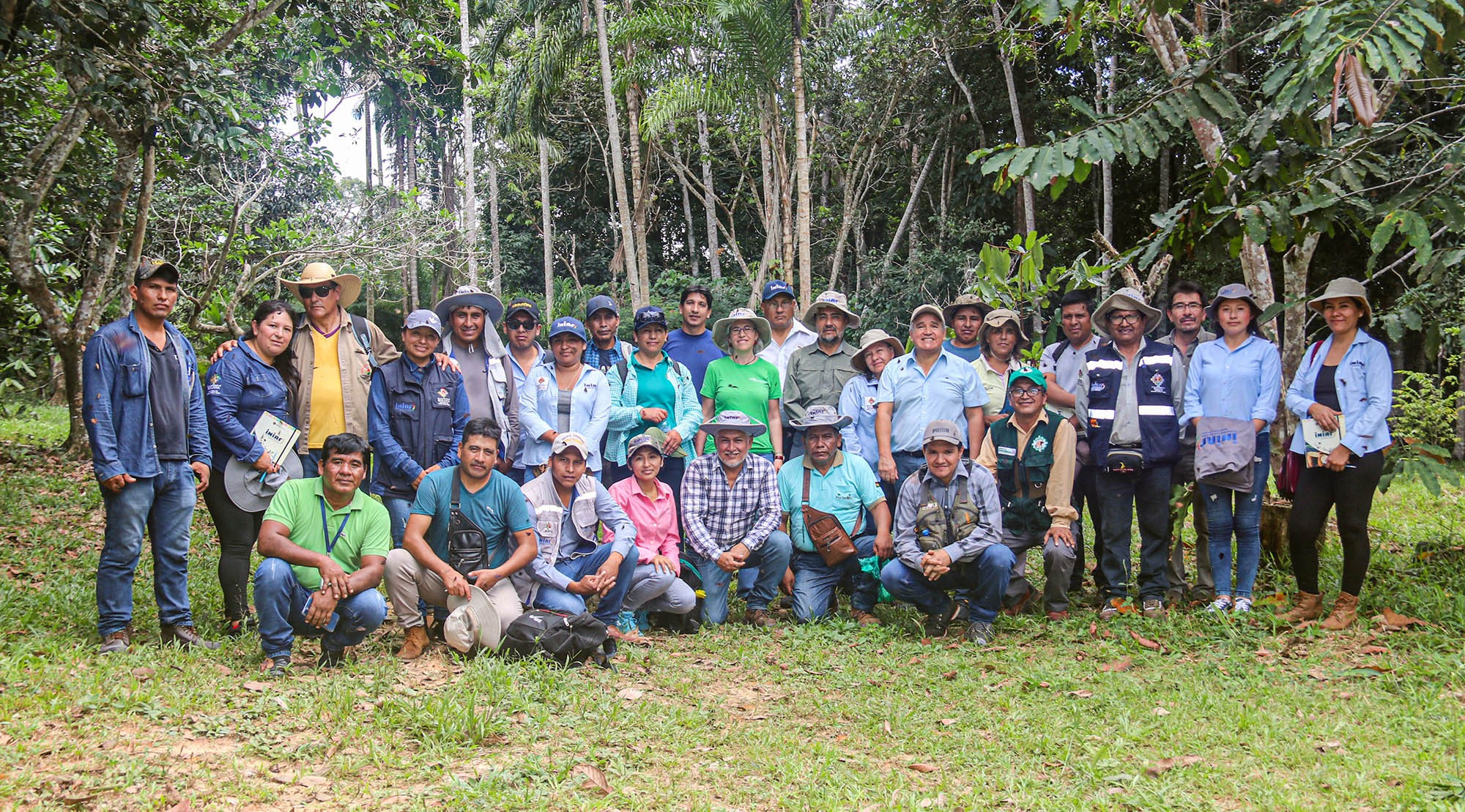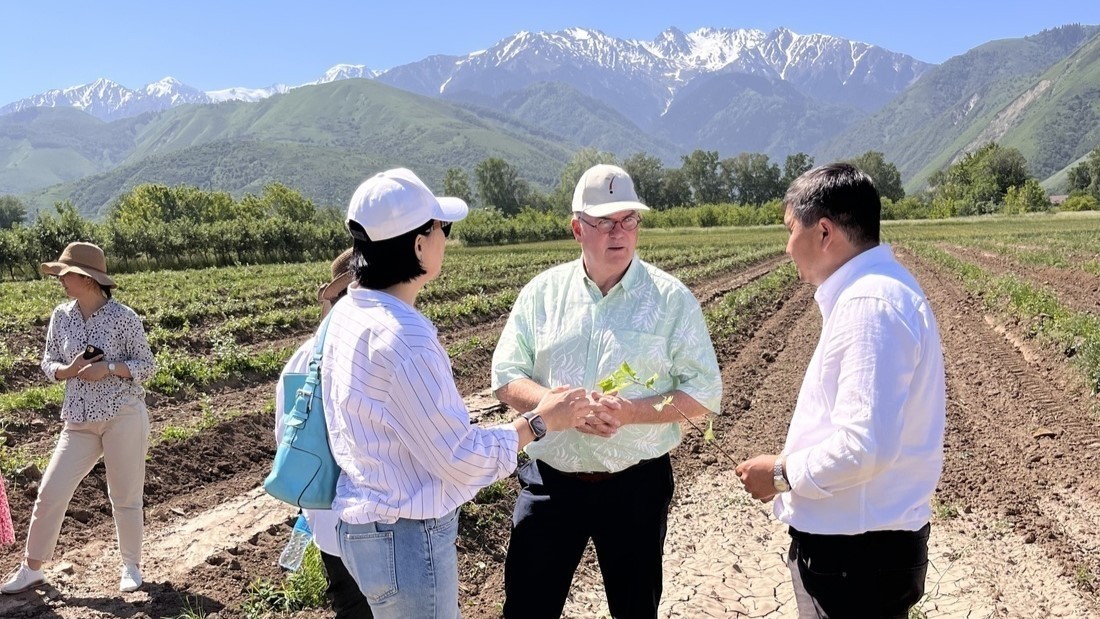Together with national and international companies, organisations and governments we share our knowledge and expertise to promote learning and innovation. We participate in various international projects in our fields of expertise, such as inspection, testing and Plant Breeders’ Rights.
PVP Toolbox
We share our knowledge of Plant Breeders' Rights worldwide. The PVP Toolbox is the framework for projects that highlight the importance of Plant Breeders' Rights and knowledge of this subject. The main demand for the Toolbox projects is from agricultural councils. The Ministry of Agriculture, Nature and Food Quality (LNV) provides funding for the PVP Toolbox.
Read more about this in the featured article ‘We share our knowledge of Plant Breeders' Rights worldwide’.
Ghana
In September we provided training on Plant Breeders' Rights and DUS (Distinctiveness, Uniformity and Stability) testing in Ghana. The course was aimed at supporting Ghana in the implementation of the UPOV Convention after its accession in December 2021. The training focused on creating capacity for the PVP office and raising awareness among potential users. Various topics were addressed, including the application processes for BBR, UPOV Prisma, administrative and technical aspects of testing, enforcement and the UPOV ePVP system.
Egypt
In November we visited Egypt to give training on Plant Breeders' Rights and DUS testing. The agricultural sector is a critical and successful pillar of Egypt's economy. The country has therefore implemented various policies, including the ‘Sustainable Agricultural Development Strategy 2030’which aims to boost production and promote efficient use of water resources. In addition, Egypt became a member of the UPOV in November 2019. The training centred on assessing the distinctness, uniformity and stability of plant varieties, with a specific focus on potatoes, sweet peppers, roses and other crops. The daily training sessions examined the crops using the techniques outlined in the Dutch calibration manual combined with practical exercises and company visits.
Bolivia
In April we provided training on developing national protocols based on UPOV guidelines for four local crops (Castaña, Asaí, Majo and Copoazú). The cultivation of tropical fruit has an important role worldwide. In Bolivia there are no breeding programmes for these varieties. Despite this, the Bolivian authorities are keen to define the descriptions of existing local varieties, and in particular the economically important species from the Bolivian Amazon. The purpose of the visit was to train INIAF (National Institute for Agricultural and Forestry Innovation in Bolivia) experts in developing national protocols based on UPOV guidelines for local species, as other UPOV members have no existing guidelines or experience. We also took part in a seminar that explained the significance and benefits of PBR. Our contribution was supported by cooperation with experts from Mexico.

SeedNL-projects
SeedNL supports access to sufficient, safe and nutritious food while promoting innovations that enable sustainable seed sector transformation. SeedNL facilitates collaboration between relevant Dutch organisations and international partners. Naktuinbouw participates in various SeedNL projects.
Nigeria
The ‘Collaborative Seed Programme’ (CSP) in is a four-year initiative in Nigeria that started in 2021. It contributes to the ‘Nigeria-Netherlands Seed Partnership’. The goal of this project is to develop the seed sector in Nigeria. In July, officials from the Nigerian NASC (National Council for Agricultural Seeds in Nigeria) and the Collaborative Seed Programme came to the Netherlands to gain knowledge and experience of seed quality assurance systems. They also paid a visit to Naktuinbouw. Naktuinbouw is contributing to the work package that focuses on Plant Breeders' Rights.
Bangladesh
In September, Naktuinbouw was a member of the Dutch Seed Sector Assessment mission to Bangladesh. This was funded and supported by Wageningen Centre for Development Innovation (WCDI), SeedNL and the Netherlands Enterprise Agency (RVO). The focus of the mission was on vegetables, potatoes and ornamental crops. We gained a better impression of the current status of the seed sector, including policies, regulations and their practical implementation in Bangladesh. Public and private stakeholders are clearly involved in cooperative efforts aimed at improving seed quality and boosting production. This will ultimately benefit farmers, society and the environment.
Philippines
The Philippines is working to establish a National Seed Technology Park (NSTP). The government of the Philippines asked the Dutch embassy whether the Netherlands could contribute its knowledge and expertise. Two experts from the Philippines have undergone intensive training at Naktuinbouw, focusing on laboratory work. This training has boosted their skills in this specific area.
EU-projects
Naktuinbouw also participates in various EU projects.
TAIEX missions
Naktuinbouw welcomed two delegations in the framework of TAIEX. TAIEX is the Technical Assistance and Information Exchange instrument of the European Commission and provides technical assistance and shares best practices with partner countries wishing to adapt or apply EU regulations. Experts from Colombia received training on Cannabis Sativa at Naktuinbouw, while a delegation of experts from Serbia was informed about conservation varieties. Naktuinbouw also took part in an visit of experts to Japan. The purpose was to strengthen and harmonise the enforcement of Plant Breeders' Rights.
IP Key China
Naktuinbouw participates in IP Key projects. IP Key are Intellectual Property Key projects. In 2023, experts from the Variety Testing Department took part in a three-day webinar about DUS for Chinese DUS experts. Varieties covered by this webinar included cauliflower and Phalaenopsis.
INVITE
The EU is financing a European project aimed at, among other things, phenotyping of plant varieties: INVITE. This is a five-year research project intended to improve VCU testing (Value for Cultivation and Use) and DUS testing (Distinctness, Uniformity and Stability). The emphasis is on developing new measurement and analysis methods. Nine countries are participating in the project. The focus in the Netherlands is setting up a fast, cheap method to automate the measurement procedure of a number of external traits. Naktuinbouw's contribution to the project is image analysis, DNA and making data available.
We consider it vital to be able to perform DUS and VCU testing as reliably and efficiently as possible. This project contributes to that aim. We are focusing on representative crops that are important in the Dutch situation, such as potatoes, perennial ryegrass, wheat and tomatoes. Naktuinbouw provided data for grass (value for cultivation). In July, a number of researchers from Wageningen University & Research (WUR) visited test location Tollebeek. They wanted to assess the possibilities for additional testing for potatoes and grasses. For potatoes, the biggest gains can be made in the field of molecular markers. With grasses, they looked at whether a number of measurements of the inflorescence could be performed using a different, automated method.
Naktuinbouw cooperates closely in this project with partners including the CPVO, GEVES France and WUR. The project will run up to the end of December 2024.

Cooperation to improve working methods and innovate
Naktuinbouw cooperates with European organisations to improve working methods and innovate.
GEVES
Naktuinbouw was visited by the management of the French research station for breeders' rights GEVES in March 2023. During this visit, both organisations signed a Memorandum of Understanding to consolidate the working partnership. Cooperation in the area of DUS testing and the laboratories was discussed by the management of both organisations. The agenda also included various projects such as DNA, electrophoresis and disease resistance, while international cooperation with organisations such as UPOV and the CPVO was also discussed.
In May, the 16th EU VCU seminar was organised in Angers, France where the event was hosted by the research institute GEVES. More than 50 participants from 19 different research institutes attended the event. Naktuinbouw represented the Netherlands. The results and experiences of VCU testing in agriculture were shared. Key themes at this seminar were sustainability and climate change.
CPVO
The Vegetable Experts Meeting was held in Brussels in November. Naktuinbouw also attended. More than 20 vegetable experts from the network of research agencies and representatives of Euroseeds joined the meeting which delivered meaningful and insightful discussions.
Harmorescoll is a project in which the various European research stations for Plant Breeders' Rights work in a consortium to offer a harmonised collection of reference material for disease and reference testing. The project is co-funded by CPVO and led by GEVES and Naktuinbouw, with members from other European research agencies and the seed industry. The project started in 2020. Another meeting was held in November 2023. The harmonisation of the isolates' collections was almost completely agreed and agreements were also made on the submitting seed for resistance testing. From 2024, the Plantum Isolates collection will release seeds according to the (new) Silver Standard. Naktuinbouw manages this collection of isolates.
UPOV
Naktuinbouw is actively involved in various working groups of the UPOV. The organisation provides and promotes an effective system of plant variety protection worldwide. More than 70 countries are members of the UPOV. This year too, the activities in the technical working groups (WG) were most organised digitally.
In May, the Technical Working Party for Agricultural Crops (TWA) and the Technical Working Party for Vegetables (TWV) held sessions. In June the technical Working Party for Ornamental Plants and Forest Trees (TWO) held a session with more than 100 participants. Naktuinbouw represented the Netherlands. The online meeting mainly discussed, developed and harmonised new directives for crops and general matters regarding PBR and DUS testing.
The UPOV Technical Commission (TC) and the Administrative and Legal Committee (CAJ) held a live meeting in Geneva, France in October. This was attended by more than 160 participants from the UPOV member states. Approximately half of this number attended meetings in Geneva. Various technical issues relating to PBR were on the agenda. Head of Variety Testing Bert Scholte was one of the Naktuinbouw representatives. This was his last UPOV meeting and the chair thanked him for his commitment. He attended almost 25 TC sessions, first as a representative of Euroseeds and later to represent the Netherlands and Naktuinbouw. The chair mentioned his knowledge and constructive attitude in particular. Bert Scholte retired in early November. He is succeeded as Head of Variety Testing by Raoul Haegens.
Other international activities
Indo-German collaboration
In the framework of Indo-German collaboration, training on the latest technologies used in DUS testing based on the UPOV system was provided in September. The three Indian experts were given practical information on DUS testing of tomatoes using the UPOV system. Exchanging practical experience and information contributed to the harmonisation of procedures and standards.
Kazakhstan
Kazakhstan has huge potential as a trading nation and for the production of agricultural and horticultural crops. Kazakhstan's main goal is to improve fruit production. To achieve this, healthy propagating material is essential. Naktuinbouw has cooperated with Kazakhstan on the Certification of Fruit Crops project since the end of 2021.
In June 2023, Naktuinbouw visited Kazakhstan. In addition to visiting research institutes, the main activities were field visits and meeting growers. A seminar on the certification system and on fire blight also created an opportunity to discuss the Dutch certification system in detail. The seminar was a huge success as it was the first time that growers, propagators, researchers and the authorities had met to discuss this topics.
In September, two experts from Kazakhstan followed a two-week training course on Plant Breeders' Rights (UPOV) and DUS (distinctness, uniformity and stability) at Naktuinbouw. Kazakhstan is not yet a member of the UPOV. The purpose of the training at Naktuinbouw was to give the experts from Kazakhstan a comprehensive understanding of the organisation and our role in variety testing.

